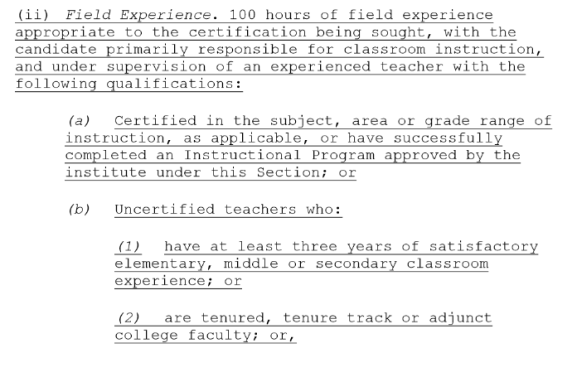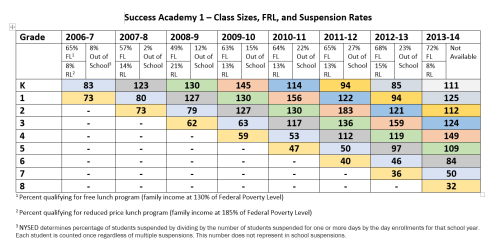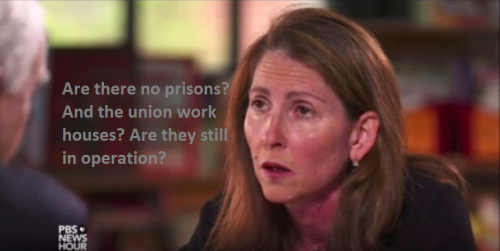New York’s charter school sector, apparently.
Politico reports that the charter sector has potentially won a much desired prize: permission to “certify” their own teachers. The SUNY Charter Institute, which grants charters and oversees some of the state’s most influential charter networks, released proposed regulations that would make it far easier for charter schools to meet requirements that they have certified teachers on their faculty by allowing them to bypass traditionally prepared teachers and create their own programs leading to certification. Under the proposed regulations, individuals with a bachelor’s degree will be able to be certified with only 30 hours of coursework:

And 100 hours of classroom practice under the supervision of an “experienced teacher”:


It is important to lay this out clearly. The New York charter sector has long worried that requirements that they have a minimum number of certified teachers on staff were becoming difficult to meet. So now, in a flurry of deal making to get mayoral control extended, they are potentially going to be able to bypass the requirement altogether. SUNY will allow charter schools to hire teachers without certification and then to “certify” them with coursework amounting to only 30 hours of instruction. For comparison’s sake, a SINGLE 3 credit college course traditionally includes 30 hours of instruction. On top of that, candidates for “certification” will need 100 hours of field experience under the supervision of an “experienced” teacher. The proposed regulation defines “experienced” as a certified teacher. It also defines “experienced” as a teacher who has completed a charter school program approved by the SUNY Institute, an UNCERTIFIED teacher with three year of “satisfactory” experience, or a teacher who completes Teach For America or a similar program. This is what will pass for teacher certification in New York’s “high performing” charter schools: 1 college course and 100 classroom hours under the supervision of an “experienced” teacher who might be no more than a just finished Teach For America corps member. Better still, “instructors” in the program might hold a master’s degree in education or a “related field,” might be certified teacher with a bachelor’s degree from an accredited program and at least 3 years experience, but might just be an uncertified teacher with 3 years experience and a “track record of success based on student outcomes (read: annual test scores),” or might be a school administrator – who in many charter schools are under 30. Candidates in the charter programs will also take required workshops on mandatory reporting of child abuse, on violence prevention, and on harassment, bullying, and discrimination.

As a matter of comparison, it is worth looking at the New York State Education Department’s certification requirements for new teachers. In order to get an initial certificate through a traditional teacher preparation program as an elementary school teacher for grades 1-6, a prospective teacher at any of the institutions on this list must complete an NYSED registered program that has been determined to contain the “studies required” to become a teacher, must be recommended to NYSED by that program, must pass the state certification exam, must pass the state content specialty exam for elementary teachers, must pass the externally evaluated performance assessment called edTPA, must take workshops on the Dignity for All Students Act, and pass a criminal background check based on their fingerprints.
And what does that preparation in an NYSED registered program look like? City University New York – Hunter College has a program for childhood education in urban settings, and candidates in it must complete 34 credits in theory and methods across either 6 or 4 semesters. Before reaching student teaching, candidates are placed in the field in three different semesters for a total of 225 hours in experiences that are closely aligned with their coursework and meant to guide them into greater and greater responsibility. Student teaching is a five day a week experience for a full school day across the entire final semester in conjunction with a seminar course dedicated to the experience.
This is an example of what it takes to earn an initial certification in the state of New York. And under current rules, charter schools can have no more than 15 uncertified teachers on faculty or have more than 30% of their faculty uncertified, whichever number is lower. Consider that — Success Academy and other “high performing” networks authorized by SUNY would be able to bypass all of that preparation and experience represented by traditionally prepared teachers in favor of using their own teachers with extremely limited experience to “certify” new hires who have no experience whatsoever. This is not a pathway for teachers who are professionals empowered with knowledge and experience to make the best decisions for their students, but it is a highly efficient pathway to train people with no experience and relevant knowledge into a system based upon tight behavioral controls and scripted lessons that leads to predictable results:
Further, this system almost certainly appeals to charter school chains who rely upon a rapidly turning over cohort of new teachers, some of whom stay if they adapt quickly to the in-house system, but most of whom eventually leave teaching altogether. Shortening teacher preparation into 30 instructional hours and 100 classroom hours certainly makes it easier for these schools to recycle teachers at a rapid clip while not having to worry about regulations requiring them to retain teachers whose preparation experiences make them far more likely to want to stay in the profession – and whose accumulated coursework and classroom experiences may give them ideas of their own about how teaching and learning happen that might contradict the in-house model. If teaching students to become “little test taking machines” does not require deep knowledge, meaningful experiences, and professional discernment, then it really does not matter if preparation to teach requires less time than obtaining a cosmetology license.
Condemnations of the proposed regulatory changes were quick. The State Board of Regents issued a quick statement of concern, noting that “The Board of Regents and State Education Department are focused on ensuring that strong and effective teachers with the proper training, experience and credentials are educating New York’s children in every public school – including charter schools. SUNY’s teacher certification proposal is cause for concern in maintaining this expectation.” United University Professions, the union representing, ironically, faculty at all SUNY campuses was more forceful stating:
SUNY claims its proposed charter school teacher certification regulations “link certification to programs that have demonstrated student success and do not require teachers to complete a set of steps, tests and tasks not designed for teachers embedded in a high-quality school.” SUNY would also establish “certain parameters and requirements for charter schools that wish to operate alternative teacher preparation programs.”
“SUNY appears to be saying that schools that hire teachers who complete college teacher preparation programs and meet the state’s teacher certification standards are not high quality schools. That’s ridiculous and it undermines all the work that’s been done in our state to strengthen teacher preparation and improve the teacher certification exams and process,” said Jamie Dangler, UUP’s vice president for academics and a member of the state’s edTPA Task Force.
The New York Post gushed about the proposed regulations, claiming that it will allow experienced professionals such as engineers and lawyers to become teachers, but once you look at the pathway and the “need” it is filling, one has to seriously wonder how many experienced engineers are itching to switch careers this way? What SUNY is really doing here is setting up charter schools, which primarily operate within urban school systems, to a lot of African American and Hispanic parents not to worry if their children’s teachers are highly educated, tested, professionals – training them to focus on test preparation above everything else just isn’t that difficult anyway.
Ironically, the regulations may very well help charter schools in the short term while creating massive problems for themselves later on. Jersey Jazzman explains this situation very well. The draft regulations strongly imply that the certification is not transferable beyond other charter schools authorized by SUNY. That means that teachers certified this way will not have a way to take their early career experience to public schools in New York – or anywhere else for that matter – and be considered a certified teacher. As Jazzman points out, this is a way for charter schools to rig the labor market because they are having greater difficulty convincing certified teachers to join them, so that helps them have enough “certified” teachers without attracting ones from traditional programs. But this will eventually put them into a bind by closing off their ability to “free ride” the public system by taking up the least expensive years of a teaching career while district schools pay experienced teachers more – even if they come over from charters. That’s not possible with this regulation since charter school “certified” teachers will have no pathway into public school classrooms, so either charters will have to cough up better benefits and working conditions…or they will end up right back where they started with staffing shortages.
At the end of the day, the people who will suffer the most will be the families and children in New York’s SUNY authorized charter schools. They currently know that a substantial portion of their schools’ faculty have earned certification through programs, that while not perfect by any means, emphasize knowledge, experience, and practice. Now these schools, who largely serve urban students, will be increasingly staffed by faculty with even less experience and knowledge and who are chosen more for their capacity to be molded into the kind of people who have no qualms about turning 8 year olds into “little test taking machines.”
If the SUNY Board of Trustees is really saying that this is acceptable for anyone’s children, they should take a good long look in a mirror before voting this Fall…and then maybe send their own kids to a classroom like that.













